外研版(2019)必修第一册Unit 2 Exploring English Understanding ideas 课件(共22张PPT)
文档属性
| 名称 | 外研版(2019)必修第一册Unit 2 Exploring English Understanding ideas 课件(共22张PPT) | 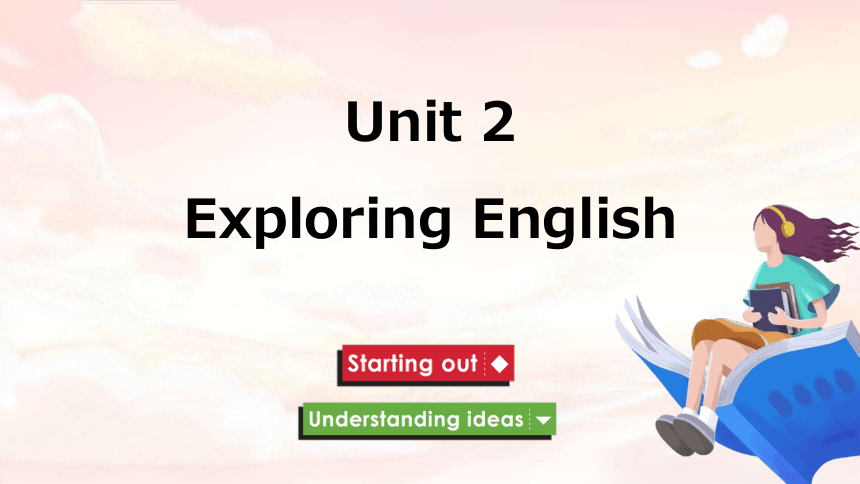 | |
| 格式 | pptx | ||
| 文件大小 | 44.8MB | ||
| 资源类型 | 教案 | ||
| 版本资源 | 外研版(2019) | ||
| 科目 | 英语 | ||
| 更新时间 | 2024-07-01 13:20:36 | ||
图片预览

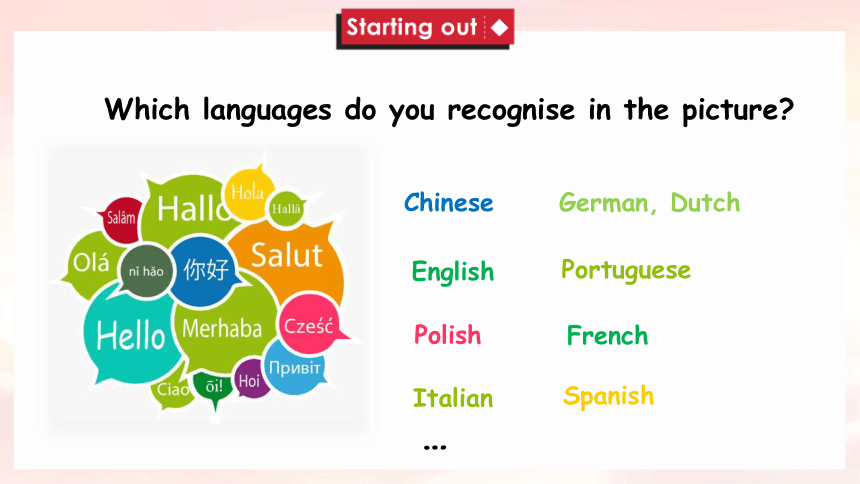
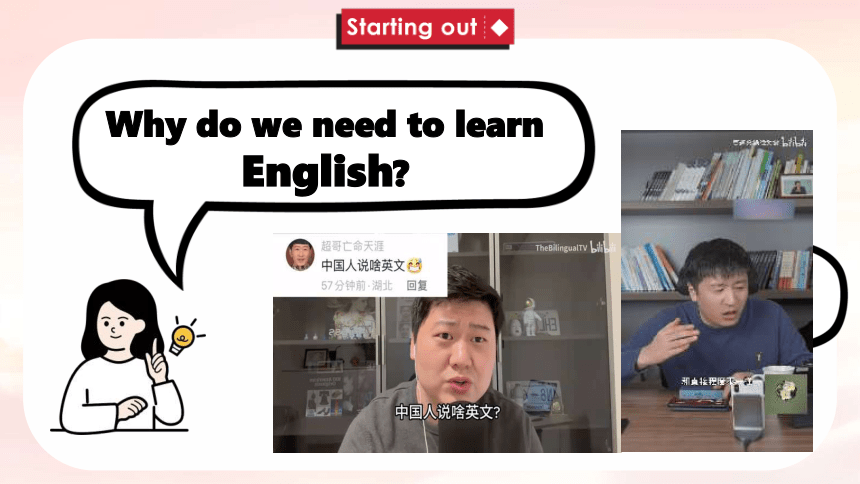
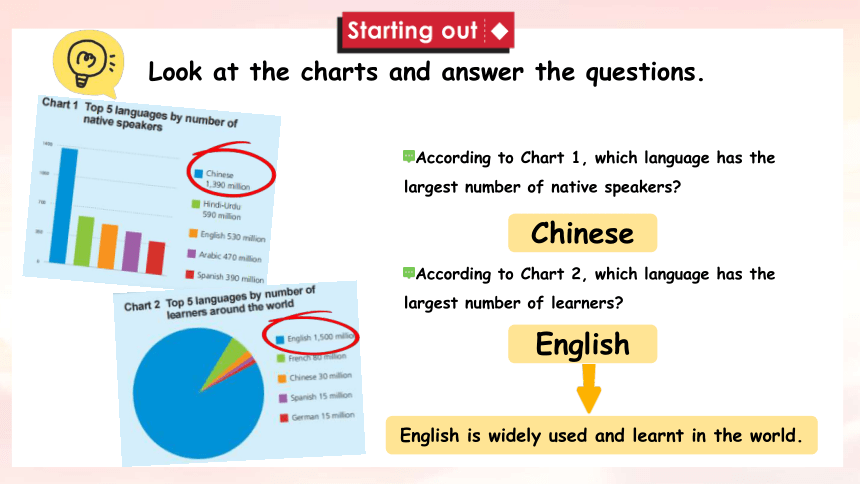
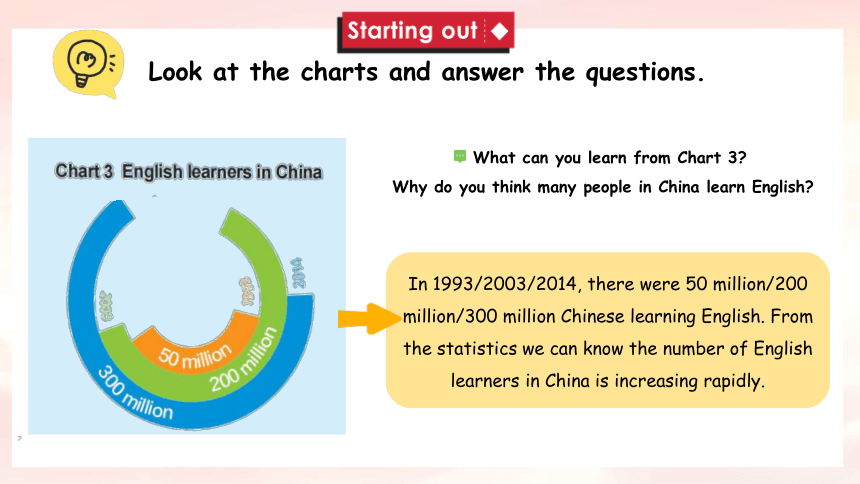
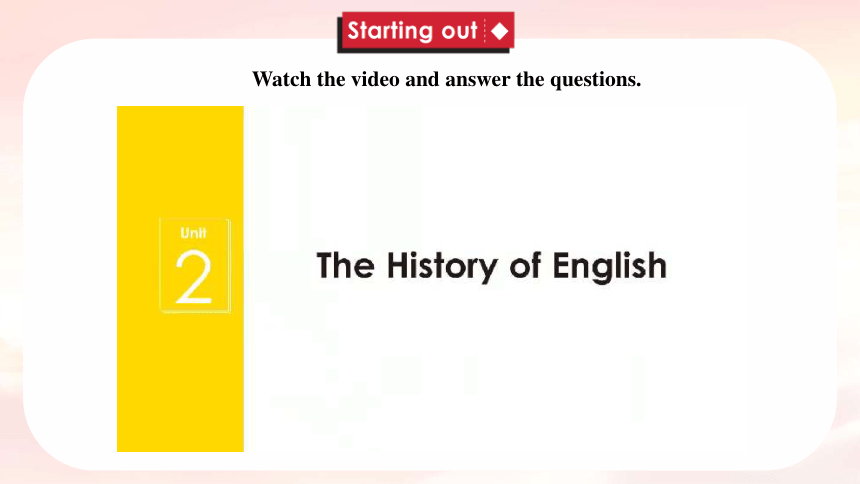
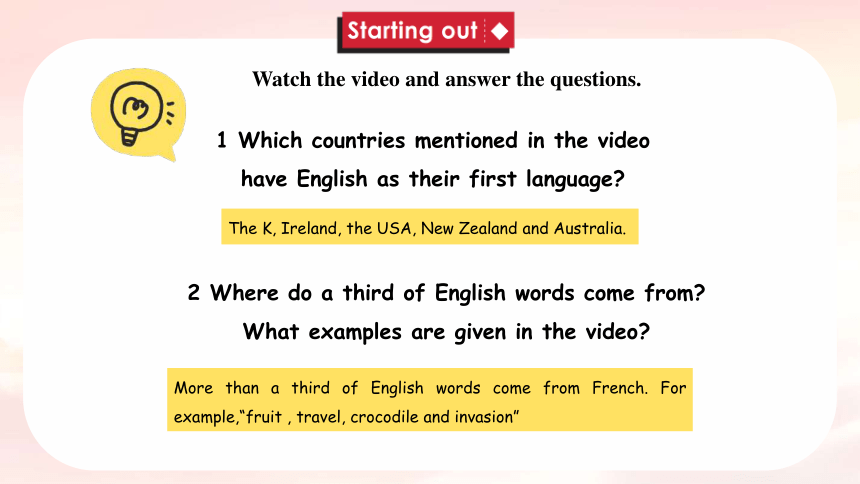
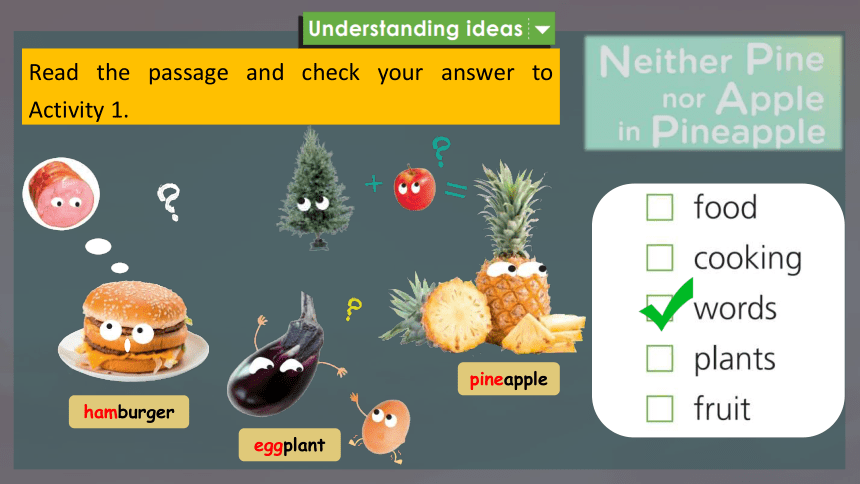
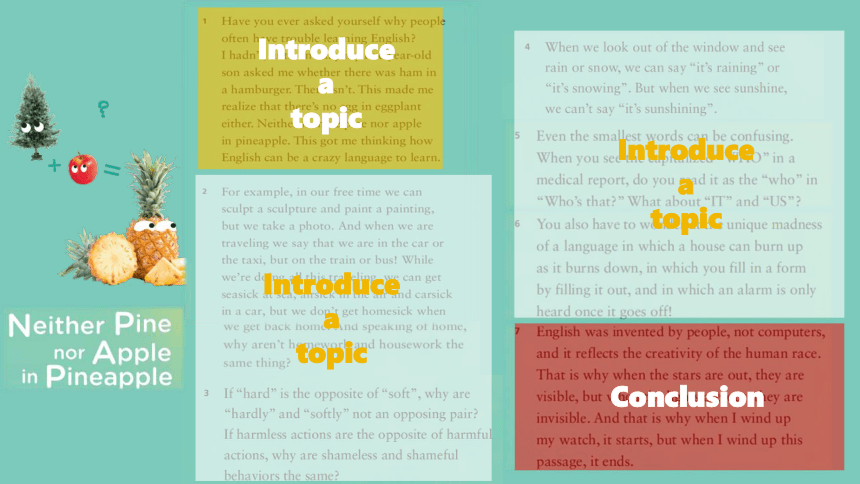
文档简介
(共22张PPT)
Unit 2
Exploring English
Which languages do you recognise in the picture
Chinese
English
French
Italian
Portuguese
German, Dutch
Polish
…
Spanish
Why do we need to learn English
Language is information.
Information is everything
Look at the charts and answer the questions.
According to Chart 1, which language has the largest number of native speakers
According to Chart 2, which language has the largest number of learners
Chinese
English
English is widely used and learnt in the world.
Look at the charts and answer the questions.
What can you learn from Chart 3
Why do you think many people in China learn English
In 1993/2003/2014, there were 50 million/200 million/300 million Chinese learning English. From the statistics we can know the number of English learners in China is increasing rapidly.
Watch the video and answer the questions.
Watch the video and answer the questions.
The K, Ireland, the USA, New Zealand and Australia.
1 Which countries mentioned in the video
have English as their first language
More than a third of English words come from French. For example,“fruit , travel, crocodile and invasion”
2 Where do a third of English words come from
What examples are given in the video
Look at the title of the passage and the pictures.
Tick what you think the passage is about.
Read the passage and check your answer to Activity 1.
hamburger
eggplant
pineapple
Introduce a
topic
Introduce
a
topic
Introduce
a
topic
Conclusion
Read the diary again and then complete the structure of it.
Introduce a topic
invented by people,reflects the creativity of the human race
That is why...
Give examples
To ask a question
—No ham in hamburger...→a crazy language
confusing
opposite
out of the window
capitalized words
phrases
Conclusion
Read the diary again and then complete the structure of it.
Compound words
Derivative words
Abbreviation
Phrases
Examples
eggplant;hamburger;
pineapple;seasick;homesick
sculpture,painting;hardly;softly;
harmless:harmful;shameful;shameless
WHO;IT;US
burn up/down;fill in/out;
go of;wind up
To tell us that English is very difficult to learn.
To give advice on how to learn English.
To show that English is interesting and creative.
To explain how English was created.
Choose the author’s purpose in writing the passage.
Discuss with your group members.
Find sentences in the article that convey the author's point of view.
1. opposing
the opposing team
oppose doing sth.
be opposed to (doing) sth.
just the opposite
be opposite to
练习:The article tries to show _________(oppose) views on the issue.
对方球队
反对做某事
反对(做)某事
正好相反
与……相反,与……相对
Vocabulary
opposing
2. behavior
behave
well-behaved
badly-behaved
behave oneself
good/bad behavior
be on one's best behavior
one's behavior towards…
练习:
I want you both to _________________________ (尽可能好地表现) at the party.
be on your best behavior
v. 表现;表现得体
adj. 表现好的
adj. 表现差的
表现得体,有礼貌
良好/恶劣行为
尽可能好地表现,尽量表现得体
某人对……的态度
Vocabulary
3. confusing
confuse
confused
confusion
be confused about
become/get confused
in confusion
confuse A with/and B
练习:Although she managed to buy some medicine, the _________________(confuse) instructions on the bottle really made her confused.
confusing
v. 困惑;混淆
adj. 困惑的;糊涂的
n. 困惑;混淆
对……感到困惑
变得困惑
困窘地,不知所措地
把A与B混淆
Vocabulary
4. reflect
reflection
be inflected in
be a reflection of…
be lost in reflection
on/upon reflection
练习:
Mary looked at her face _____________(reflect) in the lake.
reflected
n. 反映;影像;沉思
反映在……中;映在……中
是……的反映
陷入沉思
经过考虑/深思
Vocabulary
5. wind up
wind up doing sth.
wind the car window up/down
wind sh. up
wind up the discussion/meeting
练习:
If we all agree, let’s ________________________(结束讨论).
wind up the discussion
以做某事告终
讲车窗摇上去/下来
惹某人生气;捉弄某人
结束讨论/会议
Vocabulary
Activity 4
Complete the notes with words from the passage.
unique
hamburger
pineapple
painting
airsick
carsick
homesick
opposing
behaviours
fill out
invisible
ends
reflects
Can you find similar situation in Chinese
Ma po
wife
fish
lion
Activity 5
Read the following information and answer the questions.
1 How did pineapples, hamburgers and eggplants get their names
2 Does the information above give you a better understanding of the passage
Give your reasons.
1 Do you agree with the author’s opinion about the English language
Give your reasons.
2 What do you find most challenging about learning English
How do you deal with this
Think & share
Review what you have learnt in this class;
Write a passage about similar examples in Chinese, following the structure of the passage you have learnt
Homework
Unit 2
Exploring English
Which languages do you recognise in the picture
Chinese
English
French
Italian
Portuguese
German, Dutch
Polish
…
Spanish
Why do we need to learn English
Language is information.
Information is everything
Look at the charts and answer the questions.
According to Chart 1, which language has the largest number of native speakers
According to Chart 2, which language has the largest number of learners
Chinese
English
English is widely used and learnt in the world.
Look at the charts and answer the questions.
What can you learn from Chart 3
Why do you think many people in China learn English
In 1993/2003/2014, there were 50 million/200 million/300 million Chinese learning English. From the statistics we can know the number of English learners in China is increasing rapidly.
Watch the video and answer the questions.
Watch the video and answer the questions.
The K, Ireland, the USA, New Zealand and Australia.
1 Which countries mentioned in the video
have English as their first language
More than a third of English words come from French. For example,“fruit , travel, crocodile and invasion”
2 Where do a third of English words come from
What examples are given in the video
Look at the title of the passage and the pictures.
Tick what you think the passage is about.
Read the passage and check your answer to Activity 1.
hamburger
eggplant
pineapple
Introduce a
topic
Introduce
a
topic
Introduce
a
topic
Conclusion
Read the diary again and then complete the structure of it.
Introduce a topic
invented by people,reflects the creativity of the human race
That is why...
Give examples
To ask a question
—No ham in hamburger...→a crazy language
confusing
opposite
out of the window
capitalized words
phrases
Conclusion
Read the diary again and then complete the structure of it.
Compound words
Derivative words
Abbreviation
Phrases
Examples
eggplant;hamburger;
pineapple;seasick;homesick
sculpture,painting;hardly;softly;
harmless:harmful;shameful;shameless
WHO;IT;US
burn up/down;fill in/out;
go of;wind up
To tell us that English is very difficult to learn.
To give advice on how to learn English.
To show that English is interesting and creative.
To explain how English was created.
Choose the author’s purpose in writing the passage.
Discuss with your group members.
Find sentences in the article that convey the author's point of view.
1. opposing
the opposing team
oppose doing sth.
be opposed to (doing) sth.
just the opposite
be opposite to
练习:The article tries to show _________(oppose) views on the issue.
对方球队
反对做某事
反对(做)某事
正好相反
与……相反,与……相对
Vocabulary
opposing
2. behavior
behave
well-behaved
badly-behaved
behave oneself
good/bad behavior
be on one's best behavior
one's behavior towards…
练习:
I want you both to _________________________ (尽可能好地表现) at the party.
be on your best behavior
v. 表现;表现得体
adj. 表现好的
adj. 表现差的
表现得体,有礼貌
良好/恶劣行为
尽可能好地表现,尽量表现得体
某人对……的态度
Vocabulary
3. confusing
confuse
confused
confusion
be confused about
become/get confused
in confusion
confuse A with/and B
练习:Although she managed to buy some medicine, the _________________(confuse) instructions on the bottle really made her confused.
confusing
v. 困惑;混淆
adj. 困惑的;糊涂的
n. 困惑;混淆
对……感到困惑
变得困惑
困窘地,不知所措地
把A与B混淆
Vocabulary
4. reflect
reflection
be inflected in
be a reflection of…
be lost in reflection
on/upon reflection
练习:
Mary looked at her face _____________(reflect) in the lake.
reflected
n. 反映;影像;沉思
反映在……中;映在……中
是……的反映
陷入沉思
经过考虑/深思
Vocabulary
5. wind up
wind up doing sth.
wind the car window up/down
wind sh. up
wind up the discussion/meeting
练习:
If we all agree, let’s ________________________(结束讨论).
wind up the discussion
以做某事告终
讲车窗摇上去/下来
惹某人生气;捉弄某人
结束讨论/会议
Vocabulary
Activity 4
Complete the notes with words from the passage.
unique
hamburger
pineapple
painting
airsick
carsick
homesick
opposing
behaviours
fill out
invisible
ends
reflects
Can you find similar situation in Chinese
Ma po
wife
fish
lion
Activity 5
Read the following information and answer the questions.
1 How did pineapples, hamburgers and eggplants get their names
2 Does the information above give you a better understanding of the passage
Give your reasons.
1 Do you agree with the author’s opinion about the English language
Give your reasons.
2 What do you find most challenging about learning English
How do you deal with this
Think & share
Review what you have learnt in this class;
Write a passage about similar examples in Chinese, following the structure of the passage you have learnt
Homework
